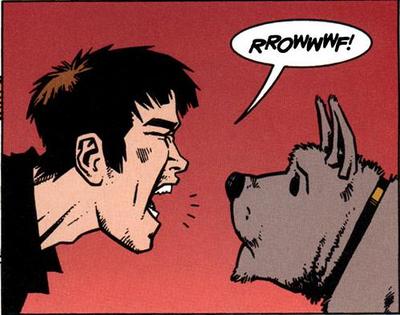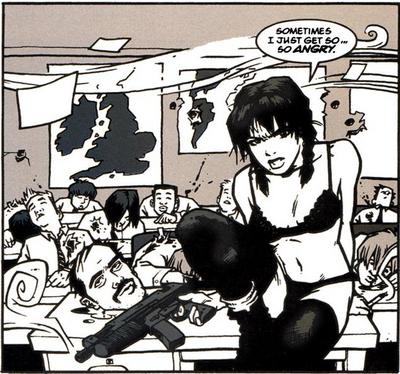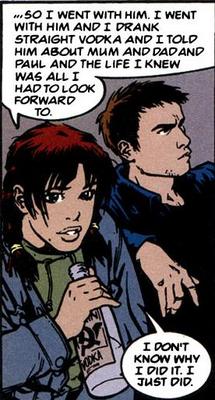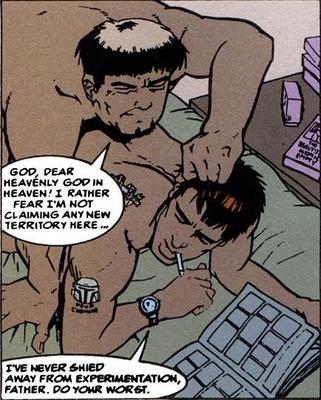Welcome back to the second part of our adventures with pop comics and the mainstream, new or otherwise. I'll be sprinkling in a few more fun panels from Kill Your Boyfriend, because images are cool. I suppose I should disclaim and all that, and mention that they're all copyrighted by Grant Morrison, Philip Bond, DC/Vertigo, or some combination thereof, or whatever.
I think, in yesterday's post, I called KYB "joycore." I could be wrong. Either way, I believe it to be so. Now, I get mocked a lot for talking about this "joycore" thing, but it's a philosophy that became completely apparent to me as soon as I heard the word. What is it, you ask? Well, the term originated via a Barbelith regular who needed a word to describe a specific feeling, that innate feeling of fist-pumping joy and awesomeness. And so joycore was born. There are numerous Barbelith threads on it. An explanatory one is here. Have some quotage, from 'Saveloy':
The word 'joycore' was invented by a Barbelith regular who most of the people here will know as Flux. He first used the term in his blog when, commenting upon a song by The Danielson Famile, he said something along these lines: "this is the most joyful tune ever made. Somebody should invent a movement for this sort of thing, and they should call it JOYCORE." A week or two later, the first joycore threads appeared on Barbelith.
As I understand it, joycore is pro things that make you go "woo-hoo!" and "yay!", and anti things that say "bah!" and "feh..." and "Pah!"
The opposite of 'joycore' is 'borecore,' which I suppose you can now figure out.
Flux: "Joycore is fairly self explanatory. It's a pro-fun, pro-imagination, self-empowering, anti-borecore philosophy. Nick's fixation on the image threads misses the point quite a bit - the threads on Barbelith give a lot of hints and clues as to what Joycore is (and a lot of its meaning is ultimately up to you, should you embrace it), but those threads are only a manifestation of the Joycore spirit, not by any means the totality of what it's all about. Ideally, Joycore and Borecore should be used as adjectives."
Personal examples of things that I find joycore include: Amazing Spider-Man Annual 1, by Stan Lee and Steve Ditko, featuring Spidey vs. the Sinister Six; Fantastic Four #5, by Stan Lee and Jack Kirby, introducing Dr. Doom and involving time-travel and pirates; Batman: The Movie, starring Adam West and Burt Ward in 1966, which I just rewatched today for the first time since I was a wee lad, and found to be absolutely awesome in its glorious and campy joycoreity (exploding sharks! pirates! engines to power! turbines to speed!); Jack Kirby’s DC work in the 1970’s, especially OMAC; Kill Your Boyfriend.
The concepts of "joycore" and "pop comics" don't necessarily go hand-in-hand, but they easily can. Most of my ideas for pop comics could be considered joycore by the right people, and I hope such a thing occurs. Who are these people? Well, I equally hope that they are members of the "New Mainstream," which is a bit of a silly term, but important nonetheless.
Now, there's a book by the name, but that's something else entirely. No, my idea of the New Mainstream has everything to do with, you guessed it, comic books. In the comic book industry, the word "mainstream" is distinctly opposite what the word means in every other form of pop culture. There, mainstream is anything that'll appeal to mass audiences. In comics, mainstream is anything that'll appeal to, sadly, hardcore comic nerds. This means one thing: Comic mainstream = Superheroes.
Now, I love superheroes, don't get me wrong. They really *are* the greatest literary invention of the 20th century like me pal Andy "The Dean" Dean says. When done right, they rock. When done wrong, which is much more frequent, they suck arse. Still. Fans (and fanboys) love their superheroes. There's nothing inherently wrong with that, it's just that that's all the comic industry seems to be, at least to an outside observer.
When one looks outside Marvel and DC, one sees much more new and diverse material. These independent publishers dabble in every genre imaginable, and some contribute very nicely to the comics medium as an art form. It's here where the *true* mainsteam lies, and where I think we can find a "New Mainstream" if we try hard enough. More and more independents are getting noticed in the media, even by high-falutin' book reviewers and the like. Art Spiegleman and Dan Clowes and friends are on bookstore shelves and on NPR and in the New York Times Book Review and all that, and they're given their proper due. Real people, intelligent people, are reading and liking comics... just not the ones with superheroes.
Comics need much more diversification in order to capture this new audience. The independents are doing pretty well, but DC and Marvel comics need to stop mollycoddling the fanboys and appeasing the hardcore nerds (yes, including myself, at times), and publish something other than superheroes. Superheroes aren’t bringing in new readers. The Big Two is preaching to the choir, no matter how hard they try not to. They need to experiment, to do new and different things and try new and different genres. Yes, they’ll fail at times, they might not make a lot of profit in the beginning... but in the long run, they may get a much larger audience interested in them.
I have lots of ideas for pop comics. I hope to write these and get them published. I want to share them with the world. Pop comics are the perfect tool to get new audiences interested in the comic medium, and hopefully I can contribute to this movement, and help find this new, important audience.
There’s a whole new mainstream out there. Find it, chase it, cuddle it, make love to it. It wants what we’re selling, it just doesn’t know it yet.
Bonzai, mofos.




No comments:
Post a Comment